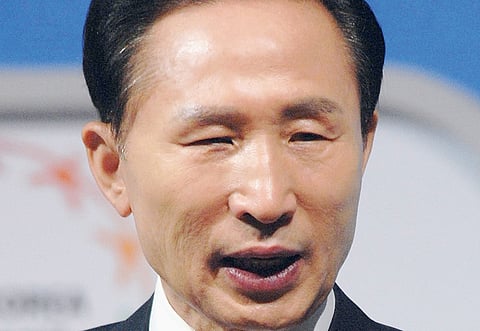Personal ties that bind
Future of US-South Korea relationship depends on political leaders' ability to forge partnerships based on shared values, not merely trade

State visits to the US by foreign leaders often carry a whiff of domestic American politics. The October visit of South Korea's president was no exception. In addition to White House meetings, a formal State Dinner, a massive lunch in the State Department's Ben Franklin Ballroom, and calls on congressional leaders, President Lee Myung-bak also addressed a joint session of Congress. Accompanied by his host, President Barack Obama, Lee also journeyed into America's heartland to visit an automobile factory in Michigan.
All of these elements of diplomatic protocol are familiar, but Lee's visit carried with it something more: it was also a celebration of the relationship that the two presidents — and their predecessors — have forged to make the South Korean-US partnership one of the strongest in the world.
A good test of a bilateral relationship's durability is, of course, how long it has endured — and also how it has endured leadership changes. In the case of the US and South Korea, the relationship strengthened during the administration of a Republican, George W. Bush, with Obama's Democratic administration sustaining that trend.
Equally important, the relationship has deepened over the course of two ideologically different South Korean governments: that of the left-leaning Roh Moo-hyun, who worked effectively with Bush, and now under the right-leaning Lee, who was paired first with Bush and, for the past three years, with Obama.
Leaders' personal relationships are built on something deeper, and in the South Korea-US case there is much to build on, starting with a traditional mix of mutual interests and shared values.
From South Korea's perspective, there has been another ingredient: the distant power.
At first — indeed, for several decades — the relationship did not look like a partnership. Korea remained known to much of the American public mostly as a war, even though it had long since become a successful republic, with a thriving economy whose products and brand names had begun to penetrate world markets.
Open markets
Moreover, South Korea opened its own markets and welcomed an international presence. For a country once known as the ‘hermit kingdom', this took some doing. Many Americans, accustomed to Japanese imports and brands, experienced a sense of deja vu in the late 1980's when the first Korean automobiles rolled into the US market.
The US-South Korea relationship is not just about trade, however. Their leaders' personal ties do matter. Whether the country-to-country relationship can thrive in the future will depend at least in part on future political leaders' ability to do what Roh, Bush, Lee, and Obama have done: forge a partnership, not just conduct transactions.
US leaders' foreign trips do not necessarily sit well with the American people. Too often, congressional trips to distant countries have been held up to ridicule upon media revelations that the trip included a tourist destination or, worse, a shopping excursion.
It is difficult to imagine that George H. W. Bush could have assembled the Gulf War coalition without the personal relationships that he forged over many years prior to that crisis. And, when Iraq lurched through months of political uncertainty as a new government was formed in 2010, Vice-President Joseph Biden was able to make an enormous contribution, owing to his six visits to the country during the preceding year.
One wonders whether future US presidents and vice-presidents will be given the time and space needed to develop the strong personal relationships with other world leaders on which an effective foreign policy depends. As Lee's recent visit to the US proved, there is no substitute for a face-to-face meeting.
— Project Syndicate, 2011
Christopher R. Hill was US ambassador to Iraq, South Korea, Macedonia, and Poland and chief US negotiator with North Korea from 2005-09. He is now dean of the Korbel School of International Studies, University of Denver.



